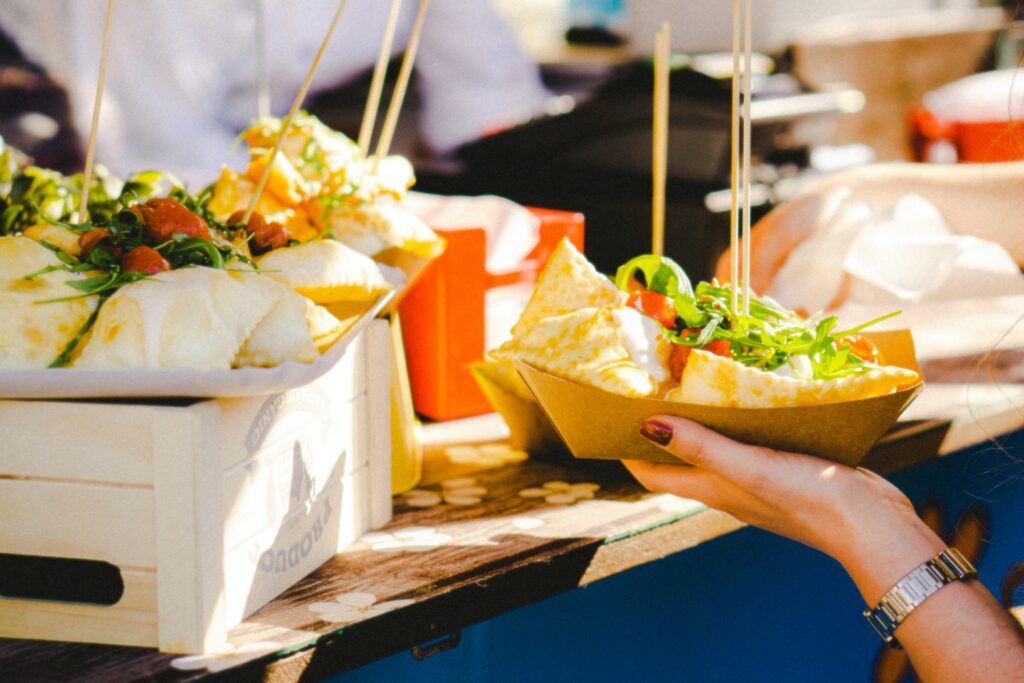Why Restaurants Should Participate in Food and Wine Festivals

Running a restaurant is demanding, especially when you focus on gaining more exposure and growing your business. Every marketing dollar needs to count, particularly when managing a tight budget, and you’re constantly weighing where to invest for the best return. While digital ads and social media are crucial tools, there’s a unique, high-touch power found in the energetic atmosphere of food and wine festivals. Understanding why restaurants should participate in food and wine festivals means seeing these events not just as a chance to serve food and bev off-site, but as a dynamic, strategic marketing opportunity to amplify your brand’s reach, forge genuine connections with new customers, test-drive new menu concepts, and ultimately boost sales.
Let’s cover more about why restaurants should participate in food and wine festivals and why carving out some budget for these strategic events can be a genuinely smart move for your growth and exposure.
Think Beyond the Everyday Buzz: The Unique Advantage of Food & Wine Festivals
Food and wine festivals deliver much more than a fun outing for enthusiasts—they create dynamic opportunities for restaurants of every kind. Whether you own or manage a food truck, a casual eatery, a catering business, an established fine dining restaurant, or a multi-location restaurant, these festivals are lively, high-potential arenas ready to be tapped. Participating strategically allows you to tap into an immersive environment, showcasing your culinary artistry to passionate attendees eager to experience your signature dish or a perfectly matched wine pairing, sharing their delight instantly on social media, and becoming devoted customers after that first memorable interaction. They act as powerful catalysts, bringing people together, crafting unforgettable culinary moments, and serving as marketing platforms to fuel your restaurant’s growth.
Consider the scale and excitement of wine and food festivals: From world-renowned events like Taste of Chicago or the prestigious Pebble Beach Food & Wine and BottleRock Napa Valley in culinary hotspots to cherished local community gatherings across the nation, these events offer an incredible stage. No matter the location or size, each festival, large or small, presents a valuable chance to increase visibility, experiment with flavors or pairings, and cultivate a loyal customer base.

5 Reasons Your Restaurant Should Participate in Food and Wine Festivals
1. Get Your Name Out There: Amplify Brand Awareness & Exposure
One key reason why restaurants should participate in food and wine festivals is the unparalleled brand exposure. Festivals draw crowds who are specifically looking for great food and wine experiences. Setting up a booth is like launching a mini-version of your restaurant, where thousands of interested potential customers gather.
- Meet New People: Reach folks who might not otherwise reach your door. Significant events like the USA Today Food & Wine Experience in SF or the Healdsburg Wine & Food Experience pull attendees from all over.
- Create Some Buzz: A great taste or a friendly interaction can spark word-of-mouth recommendations and social media photos, videos, and shout-outs – a free marketing tactic that goes a long way.
- Build Community Ties: Putting faces to your food and brand helps forge a stronger connection with the local scene.
2. Win New Fans: Drive Customer Acquisition
Driving customer acquisition is another compelling answer to why restaurants should participate in food and wine festivals. The goal isn’t just visibility; it’s turning those festival-goers into regulars. Festivals offer a chance for personal interaction that screens can’t match.
- Connect Directly: Chat with potential customers face-to-face, giving them a real taste of your food and hospitality. Make sure to show all your offerings, such as traditional dining, catering, and private dining and events.
- Gather Leads: Offer a small incentive for email sign-ups so you can keep the conversation going long after the festival wraps up.
- Deepen Loyalty: When regulars see you out and about, it strengthens their connection. And impressing new guests? That’s how you build your future customer base.
3. Boost the Bottom Line: Generate Revenue Both Now & Later
The potential for revenue generation, both short and long term, is a significant factor in why restaurants should participate in food and wine festivals. Yes, there’s an upfront investment. But festivals can pay off both immediately and down the road.
- Sell On-Site: Many festivals let you sell food directly, helping you cover costs and potentially turn a profit immediately.
- Launch Promotions That Drive Business: Roll out seasonal specials, limited-time offers, and exclusive deals designed to boost interest and sales.
- Invest in Future Business: The exposure and new fans you gain can translate into more reservations, takeout orders, and even private event inquiries later on. Think of it as planting seeds for future foot traffic.
4. Test the Waters: Try New Concepts & Get Feedback
The opportunity for low-risk market testing adds to the list of reasons why restaurants should participate in food and wine festivals. Festivals are fantastic settings to experiment with that new dish or menu idea you’ve been considering.
- Innovate Your Menu: See how a potential special or seasonal item lands with a diverse crowd.
- Hear Directly from Guests: Get instant reactions and feedback – it’s like a focus group, but way more fun! Find out quickly if that new appetizer is a winner.
- Refine and Adapt: Use the real-time input to tweak recipes or concepts before a full rollout.
5. Make Connections: Build Valuable Industry Relationships
When considering why restaurants should participate in food and wine festivals, don’t overlook the networking potential. Remember, these events attract industry folks as well as the public.
- Network with Peers: Connect with fellow chefs, potential suppliers, beverage distributors, and sommeliers. Build relationships with fellow chefs, suppliers, beverage distributors, and sommeliers. Strong connections can lead to valuable partnerships, collaborative opportunities, and the exchange of best practices that drive success.
- Find Partners: Explore collaborations – maybe a joint event with a local winery or brewery?
- Meet Media & Influencers: Food writers, bloggers, and social media personalities often attend. A positive interaction could lead to great press.
Let’s Talk About the Budget
Okay, we know what you might be thinking: “This sounds great, but what about the cost?” Booth fees, staffing, food, logistics – it definitely adds up. For restaurants watching every penny, it’s a serious consideration when deciding why restaurants should participate in food and wine festivals.
- Think Strategically: Try framing the cost not just as an expense, but as a targeted marketing investment. The potential return on investment (ROI) includes tangible things like sales and new customers, as well as valuable intangibles like brand buzz and community goodwill.
- Start Sensibly: You don’t need to dive into the biggest, priciest festival right away. Consider starting with smaller, local events to get your feet wet and learn the ropes.
- Plan Like a Pro: What are your goals? Brand awareness? Email sign-ups? Direct sales? Choose menu items you can execute well and quickly off-site – maybe simplified versions of popular dishes. Do a realistic cost-benefit estimate.
- Do Your Homework: Research the event. Chat with the organizers and other restaurants that’ve been there. Is the crowd your target audience? What are the attendance numbers like? What kind of support do they offer vendors?

Tips to Join Food and Wine Festivals
1. Choose the Right Festival
Focus on festivals that align with your cuisine, target audience, and brand image. Research attendee demographics and past vendor lists to ensure it’s a fit. To learn if a festival is worth exploring, understand the value that the festival brings. The larger the event, the more networking opportunities you’ll have, whereas at smaller, more intimate festivals, you’ll have more opportunities to connect to potential customers.
2. Plan a Standout Menu
Offer a limited selection of high-impact, easily executable dishes. Small plates or signature bites work best — they’re memorable, easy to serve, and cost-effective.
3. Focus on Speed and Presentation
Guests expect quick service at festivals. Streamline prep, keep portions manageable, and invest in an attractive, on-brand presentation that draws attention.
4. Train Your Team
Select your best communicators to staff your booth. Everyone should know the dishes, your restaurant story, and how to engage visitors professionally and enthusiastically.
5. Promote Before, During, and After
Leverage your email list, website, and social media to announce your participation. During the event, post live updates. Afterward, follow up with a recap to keep the momentum going.
6. Capture Leads
Have an easy way to collect email addresses — through a QR code, raffle, or digital signup form — so you can stay connected with guests after the festival ends.
Wrapping Up: The Case for Festival Participation
Ultimately, restaurants should participate in food and wine festivals because these events allow you to connect with customers, elevate your brand, test new ideas, and drive growth. While budget constraints are always a factor, automatically ruling out these events could mean missing a valuable opportunity. By choosing wisely, planning meticulously, and having clear goals, participating in festivals can become a powerful part of your restaurant’s success story. Check out upcoming local events, weigh the potential costs and benefits, and consider trying it.
Does Your Restaurant Offer Private Dining and Events?
If you are ready to grow your event business, learn more about Tripleseat and schedule a demo to see our event management features in action.
